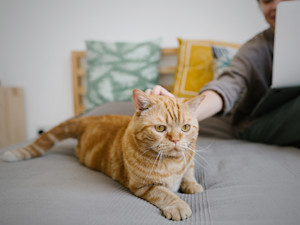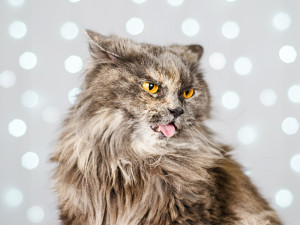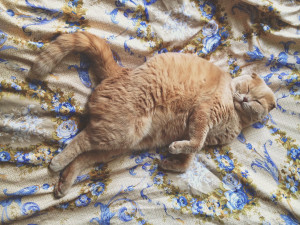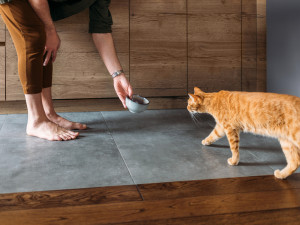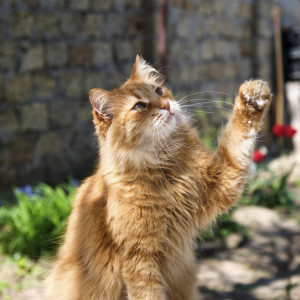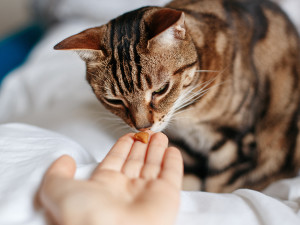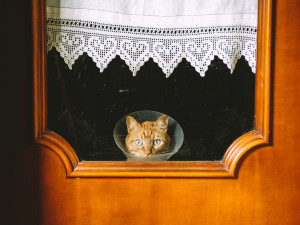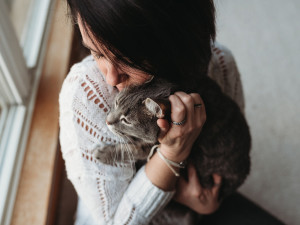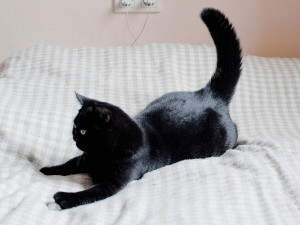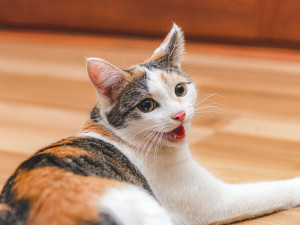Cat Jumping Off the Literal Walls? They Could Have Hyperthyroidism
Everything you need to know about the common disease.
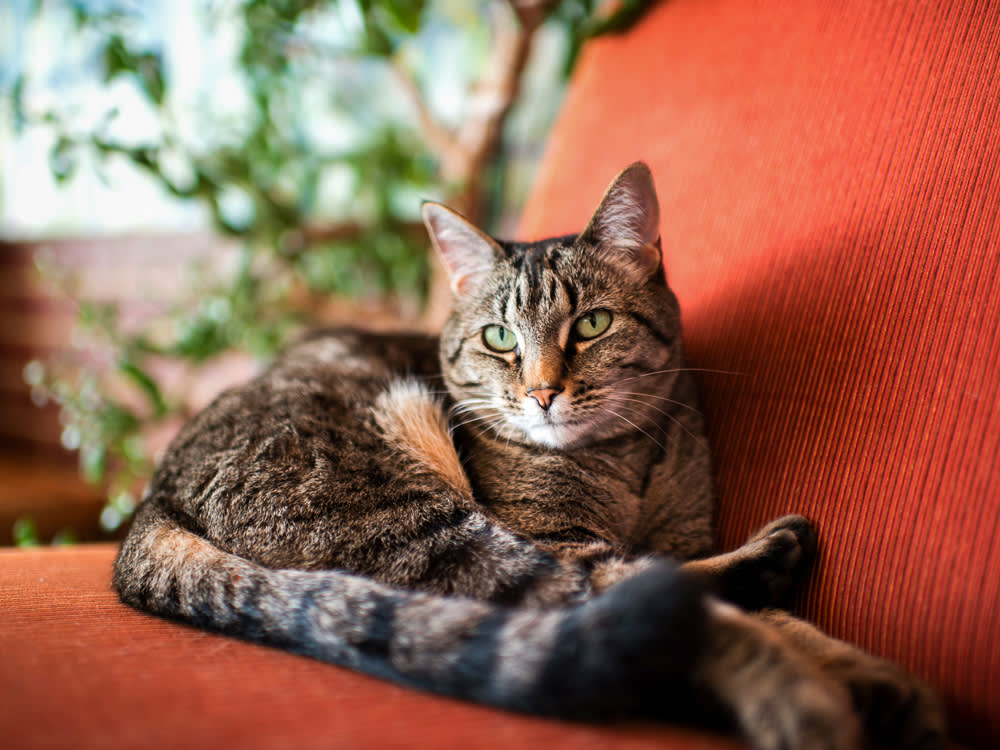
share article
Your senior cat seems hangrier than ever, is throwing upopens in a new tab more than just hairballsopens in a new tab, and is losing weight faster than the guy in Stephen King’s Thinner. Maybe they’re also chattier than usual and taking zoomiesopens in a new tab to the next level. Are they reliving their kitten glory days or is something else going on? Don’t chance it: Here’s everything you need to know about feline hyperthyroid disease, more commonly known as hyperthyroidism in cats.
What is feline hyperthyroidism and why does it sound so scary?
Bear with me for a brief science lesson: Cats have two glands in their necks that release thyroxine, or T4. Some thyroxine is converted into triiodothyronine, or T3, which are thyroid hormones that are important for metabolism, body temperature regulation, and behavior. Hyperthyroid disease is the overproduction of hormones by thyroid glands and is most often seen in cats over 10 years old.
What happens when cats have hyperthyroidism?
Cats with hyperthyroid disease often have subtle signs at the start of their disease, but can develop severe symptoms as the disease progresses. Symptoms of hyperthyroidism in cats include weight loss, increased thirst and hunger, vomitingopens in a new tab, and behavioral changes, such as hyperactivity, aggressionopens in a new tab, and increased vocalizationopens in a new tab. Common complications seen in cats with hyperthyroidism include high blood pressure, kidney disease, and heart disease.
How is hyperthyroidism in cats diagnosed?
Other chronic conditions, such as diabetes mellitus, kidney disease, cancer, and some intestinal diseases can share symptoms with hyperthyroidism. Your veterinarian can diagnose hyperthyroidism using a combination of your pet’s history, a thorough physical exam, and blood work. If your cat is displaying symptoms of hyperthyroid disease at home, your veterinarian will check for enlarged thyroid glands while performing a physical exam. A diagnosis is confirmed by measuring T4 levels in the blood.
Additional blood work is used to look for common secondary issues like kidney or liver enzyme elevations. Screening for urinary tract infections, high blood pressure, and heart disease is helpful to determine if additional medications are needed in the short or long term.
How is feline hyperthyroidism treated?
Fortunately, there are multiple ways to approach the treatment of feline hyperthyroidism. There are four common forms of treatment, all of which aim to reduce the production of thyroid hormone, and there are pros and cons associated with each type.
Medication
Medications, such as methimazole, work by blocking the production of thyroid hormone.
Pros: Available in oral and topical formulations. Topical medication eliminates the need to wrestle your kitty to give them pills they don’t want to take. Medical management also has less upfront costs.
Cons: Lifelong daily medication is needed for disease management. Methimazole can cause vomitingopens in a new tab or bone marrow suppression in some cats.
Surgery
Surgical removal of the thyroid glands is a permanent solution for feline hyperthyroid disease.
Pros: Surgery is a curative, one-time treatment.
Cons: Surgery is a costly anesthetic procedure, and anesthesia carries increased risk in older cats. There is also the risk of damaging the parathyroid glands, which are near the thyroid glands and help regulate blood calcium levels.
Diet
Iodine is required for thyroid hormone production. A prescription diet aimed at treating hyperthyroid disease has very low levels of iodine, so thyroid hormone production is limited.
Pros: A prescription diet has less upfront cost but can be expensive over a lifetime. Diet is a low-stress option for cats who will not tolerate medication.
Cons: Your cat must be exclusively fed a prescription diet (no snacks, no goodies, none of that). You’re out of luck if your cat doesn’t like the food.
Radioactive Iodine
In this treatment, your cat is given an injection of radioactive iodine. This will not give your kitty any superpowers, except for the ability to properly regulate their metabolism. The iodine will be absorbed by the thyroid glands, causing them to shrink and lose function.
Pros: Radiation is a curative treatment, meaning that long-term management of this disease is minimal.
Cons: Your cat must be hospitalized for several days after treatment until they’re a little less...radioactive. Really — veterinarians use dosimeters and everything. Extra precautions must be taken at home in the first couple of weeks after treatment to reduce human exposure to radiation. This can sound a little scary for some cat parents but may be the right answer for many cats with hyperthyroidism.
Can feline hyperthyroidism be prevented?
There is no known preventative for hyperthyroidism in cats; it is related to a benign tumor in the thyroid gland. One study showed that hyperthyroidism occurred more commonly in cats eating canned diets than dry diets. This does not mean that every cat on a canned diet will develop hyperthyroidism, and you should not change your cat’s diet suddenly without consulting your veterinarian.
Blood profiles for older cats commonly include tests for hyperthyroidism, so annual evaluations with your veterinarian can help to catch this disease before it becomes a problem. Early detection and treatment can help prevent metabolic changes that can damage your cat’s heart, kidneys, or eyes. Keeping on top of preventative care can help your kitty stay spry well into their senior yearsopens in a new tab.

Dr. Alycia Washington, DVM, MS
Alycia Washington, DVM, is a small animal emergency veterinarian based in North Carolina. She works as a relief veterinarianopens in a new tab and provides services to numerous emergency and specialty hospitals. Dr. Washington is also a children’s book author and freelance writer with a focus on veterinary medicine. She has a special fondness for turtles, honey bees, and penguins — none of which she treats. In her free time, Dr. Washington enjoys travel, good food, and good enough coffee.
Related articles
![cat being offered a treat or vitamin]() opens in a new tab
opens in a new tabThe Best Supplements and Vitamins for Cat Health
Not your mama’s multivitamin.
![cat with cone after vet visit]() opens in a new tab
opens in a new tabDoctor’s Orders: Cat Vet Visits Are Essential
Get thy cat to a vet, even if it’s a struggle to get them out the door.
![Woman in a white sweater hugging her cat next to a window]() opens in a new tab
opens in a new tabIs Your Cat SAD?
Four ways cats can combat seasonal depression.
![black cat doing zoomies on a bed]() opens in a new tab
opens in a new tabYour Cat’s Erratic Zoomies — Explained
Fast, furious, and officially normal — according to a cat behaviorist.
![kitten lying on the floor breathing through his mouth]() opens in a new tab
opens in a new tabIs My Cat...Panting?
“Cats don’t pant to cool off like dogs do.” Unless your pet is catching their breath after doing the zoomies, Dr. Gary Weitzman says it could be cause for concern.
![Profile view of a man giving a cat food to eat]() opens in a new tab
opens in a new tabWhy Is My Cat Not Eating? Causes, Symptoms, and Treatment
A veterinary nutritionist explains why your cat isn’t eating and how to increase their appetite.
